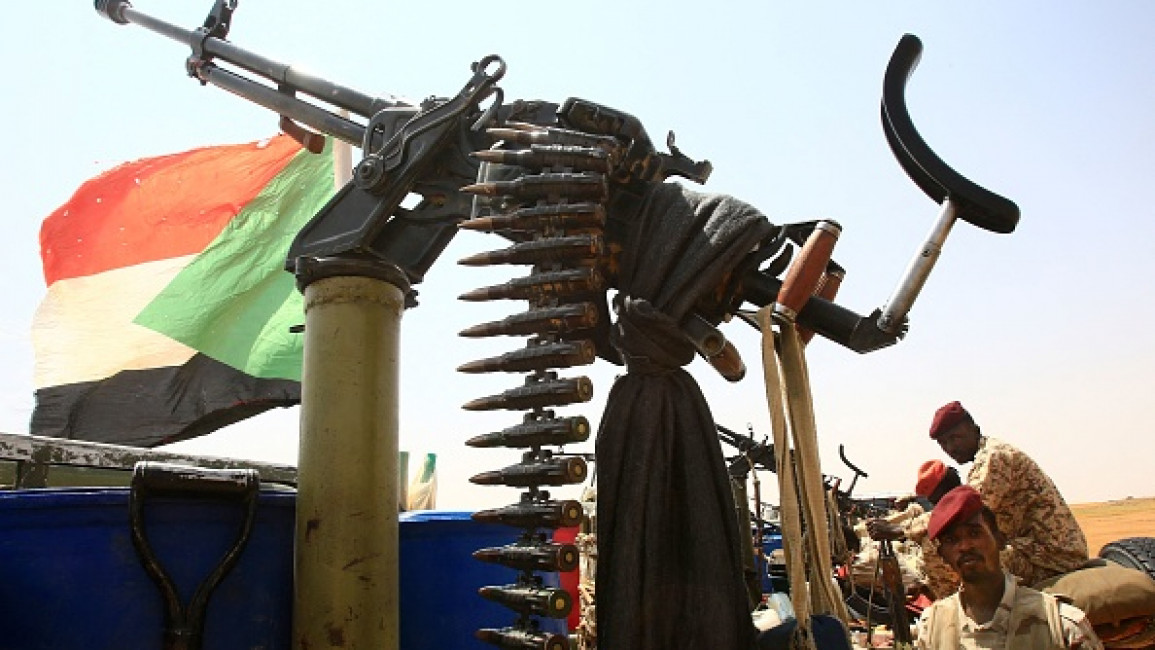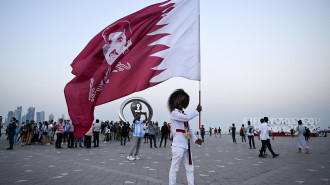
Journalists caught in the crossfire of Sudan's conflict

On 15 April, shortly after heavy fighting broke out in Khartoum between Sudan's army and the paramilitary Rapid Support Forces (RSF), a BBC journalist was beaten by a group of soldiers while on his way to work.
A correspondent and cameraman for the Al-Sharq news channel, meanwhile, were detained for eight hours near the strategic airbase of Merowe in the north, according to the Sudanese Syndicate of Journalists (SJS).
On the same day, the Sudan Radio and Television Corporation (SRTC) was forced to stop broadcasting after RSF members seized control of its headquarters, where some 15 journalists and workers found themselves trapped for two to three weeks, as documented by the Committee to Protect Journalists (CPJ), an independent press freedom group.
These incidents, which all occurred on the first day of the violent power struggle between Sudan’s army and the RSF, were just a sign of things to come.
"For me and other journalists, the situation is very, very difficult. It's just dangerous to work"
Since then, dozens of violations against journalists and media organisations have been documented, forcing most media outlets to stop working, according to press freedom organisations in Sudan and abroad.
“The suffering for Sudanese journalists in Khartoum is twofold. First, they live like other civilians in the midst of the fighting, the war deprived them of basic services, and they [suffer] the looting of their homes,” Abdelmonim Abu Idris, head of the Sudanese Syndicate of Journalists, told The New Arab.
“At the same time, they do their work in unsafe conditions, which exposes them to arrest, detention, and sometimes beatings at checkpoints.”
Fighting between the army and RSF, who in late 2021 had joined forces in a coup, has so far killed hundreds of people, displaced nearly two million, and dealt a severe blow to the country’s press freedoms.
Caught in the middle of violent clashes and intermittent internet and telecommunications blackouts, many journalists have had to stop working altogether or have decided to leave the country.
“For me and other journalists, the situation is very, very difficult. It’s just dangerous to work,” Salem Al Hashemi, a correspondent for the Arabic news television channel Al Arabiya, told The New Arab.
“For all those who [follow] the events and for all those who talk about what is happening on the ground, if any of the parties [to the conflict] do not like what was said or are not satisfied with what was said or written [it becomes] directly a threat,” he added.
This, in turn, has paved the way for both warring sides to deploy their own propaganda machines more effectively, flooding the country’s digital sphere with a mix of disinformation, fake news, and hate speech that further entrenches the conflict.
“The military conflict basically made it impossible for independent, critical journalists to operate,” said Sherif Mansour, CPJ’s Middle East and North Africa program coordinator.
“That journalists cannot do their work safely, or cannot do it without censorship, means that what remains is political polarisation; the warring parties spreading their own narratives and punishing anyone who doesn’t follow the line,” he told TNA.
|
|
One of many threats documented was the circulation of anonymous lists on social media and messaging apps containing the names of local journalists who were accused of taking sides in the conflict, putting them at risk of attacks, according to the SJS. Some journalists have received direct threats through letters and phone calls.
Several journalists have also been detained for varying periods of time in Khartoum, the western region of Darfur, and Gadarif, in the east, by members of the RSF, the army, and military intelligence, according to the SJS. Some of them have been beaten, and at least six have been injured in clashes, most in the South Darfur capital of Nyala.
The offices of a number of media outlets, including the newspapers El-Hirak El-Siyasi, El-Midan, and the radio station Hala 96, as well as the Sudan Radio and Television Corporation, have also been raided by members of the RSF or groups affiliated with the paramilitaries, according to the SJS and the CPJ.
The newsrooms of both El-Hirak El-Siyasi and El-Midan were also looted.
"That journalists cannot do their work safely, or cannot do it without censorship, means that what remains is political polarisation; the warring parties spreading their own narratives and punishing anyone who doesn't follow the line"
Journalists and media workers from the state news agency SUNA and TV channels Hurra TV and Russia Today (RT) found themselves trapped inside their offices for several days after the clashes broke out, according to SJS.
The syndicate also stated that on 12 June the vicinity of the building housing the offices of international TV channels such as Al-Jazeera, Al-Arabiya, Al-Araby, and Al-Sharq, located east of Khartoum, was subjected to artillery shelling.
The SJS has similarly monitored twenty raids on the homes of journalists in residential areas of Khartoum, mostly by the RSF. Assaults on civilian homes by paramilitaries are widespread, according to local residents and monitoring groups.
In early June, the Sudanese press organisation also documented the disappearance of one journalist as well as the death of a correspondent for Khartoum TV in the White Nile State in a traffic accident, which occurred while reporting.
“The war provides a fertile environment for violations,” noted Khaled Massa, journalist, political analyst, and member of the local press freedom group Sudanese Journalists Network (SJN). “Certainly, the case is unprecedented,” he told TNA.
Although most incidents have been documented in Khartoum, where information is more accessible, the situation for journalists is also particularly alarming in Darfur, especially in the western city of El Geneina, which is experiencing the country’s highest levels of violence and destruction, especially towards civilians.
The testimony of a journalist from El Geneina, compiled by the SJS, documented that in late May he was kidnapped at gunpoint by a group of strangers while he was working, violently beaten, and taken unconscious to a deserted place.
There, according to the same account, eight masked men, who had taken his laptop and cameras from his house before setting it on fire, interrogated him about his reports on war violations, then destroyed his equipment and beat him severely. Five days later, after being tortured, the men left.
|
|
“In the region of Darfur, a large number of journalists have been targeted because of their ethnicity, because of their tribes, because of their tribal affiliations, as the war in Darfur not only turned into a war between the Army and the RSF [but also between] Arab and African tribes,” said Mohamad Nyala, a member of the secretariat of the SJN.
“Journalists are completely unprotected in Darfur, and they are exposed to death. They cannot guarantee their safety, they cannot send news, they cannot do their work in these [very] difficult humanitarian conditions,” he explained to TNA.
“There is no communication, no internet, no protection; the situation is very bad and many journalists are suffering in a very basic sense,” Nyala added.
"This didn't just start with the most recent military conflict, it started since largely the [moment the] civilian government was ousted"
The deteriorating situation for Sudan’s journalists comes after the military coup in October 2021 had already led to increased job insecurity and a spike in the number of attacks and other abuses, such as arbitrary arrests, raids, and harassment aimed at obstructing their work, according to human rights and press freedom groups.
The SJS, meanwhile, was established as the country’s first independent journalists’ union in more than three decades in August 2022, following a successful internal election that saw Abu Idris become its head. The previous independent journalists’ union had been dissolved after former dictator Omar Al Bashir seized power in 1989.
Despite the current difficulties it is facing as a result of the war, the SJS has remained politically active and committed to peace and the return to democracy in the country. From the beginning of the conflict, it joined a civilian front launched at the end of April that calls for an end to the war and the restoration of democracy.
“This didn’t just start with the most recent military conflict, it started since largely the [moment the] civilian government was ousted. We have counted [this] deterioration, including the return of internet shutdowns, which was a hallmark of the former Bashir regime, and the return of the censors into newsrooms, with security and military officials telling journalists what they can and cannot do,” Mansour of the CPJ said.
“The recent deterioration has been troubling [because] it has been more about the physical threats: journalists being shot, assaulted, detained, having their equipment confiscated.”
Marc Español is a Catalan journalist based in Cairo.
Follow him on Twitter: @mespanolescofet




